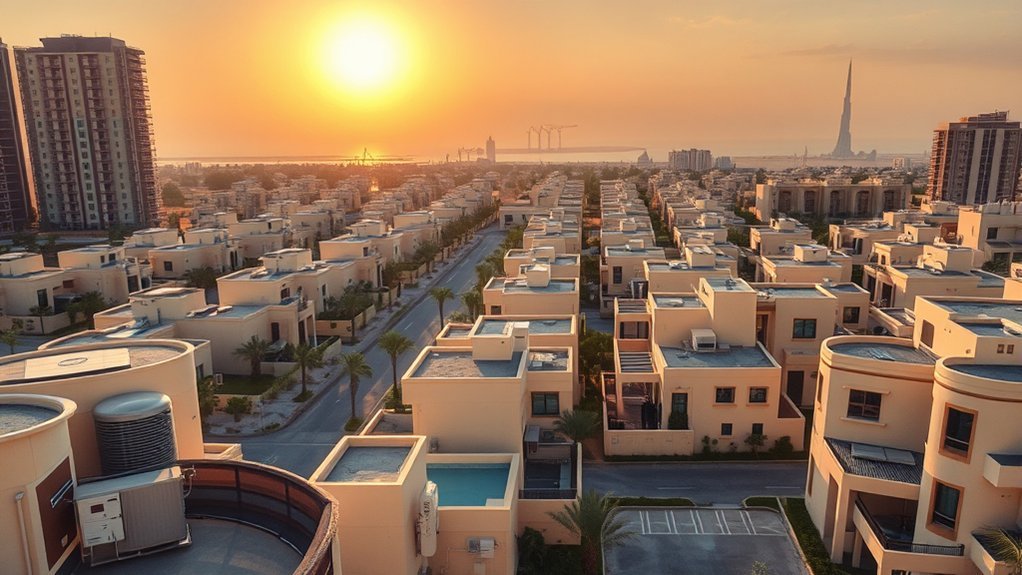You’ll generally need about $3,500–$5,000 per month to live comfortably in the UAE, though exact costs depend on city, family size and lifestyle. Rent dominates expenses — expect roughly $1,500/month for a one‑bedroom in Dubai and higher for families. Groceries run about $250–$350 per person, utilities about $130–$200, and transport $55–$190 monthly. Private health insurance and schooling add sizable amounts. Continue for a breakdown by category and city comparisons.
Average Monthly Expenses and Cost Overview

If you’re budgeting for life in the UAE, expect average monthly living costs of roughly $1,100 for a single person and about $3,600 for a family of three, excluding rent. Housing will materially increase this figure since one-bedroom rent in Dubai starts near $27,000 per year.
You’ll find the average cost of living driven by discrete line items: monthly expenses for groceries run about $250–$350 per person, so a family of four should plan accordingly when projecting cost of food.
Public transportation is affordable relative to other cities, with monthly travel cards in Dubai costing roughly $55–$95, which affects commuting budgets. Healthcare costs vary with insurance coverage, so include potential out-of-pocket healthcare costs when modeling totals.
Additional monthly expenses to consider include internet and mobile services (approximately AED 50–150/month), which are standard living costs often overlooked in initial budgets.
Public transport in Dubai is relatively affordable — monthly travel cards cost roughly $55–$95; account for healthcare co-pays.
Given prevailing average prices and incomes, a recommended monthly salary of about $5,000 is commonly cited for comfortable living in Dubai; use that as a benchmark when comparing offers for living in Dubai or relocating families.
Housing and Utilities: Rent, Buying, and Neighborhoods

Having covered monthly living costs, it helps to look specifically at housing and utilities, which are among the largest and most variable line items. You’ll find Dubai commands premium housing: average rent for a one-bedroom is about $1,500 and family units around $2,125; buying a three-bedroom villa typically exceeds $540,000 (≈2,000,000 DHS). Utilities in Dubai average $131 per individual and $203 for a family. Abu Dhabi trends lower: average rent for singles is around AED 3,500 (~$950). Sharjah is more affordable, with singles at AED 3,100 (~$850), affecting your monthly expenses and neighborhood choices.
Note that visa sponsorship fees (approximately AED 500–1,500) and residence renewal costs should also be factored into annual budgets.
| Metric | Average price |
|---|---|
| Dubai 1BR rent | $1,500/month |
| Dubai family rent | $2,125/month |
| Dubai utilities (indiv.) | $131/month |
| Abu Dhabi / Sharjah single rent | $950 / $850 |
Use these figures to assess trade-offs between rent, buying, utilities and preferred neighborhoods.
Food and Dining: Groceries, Restaurants, and Markets

While shopping habits and restaurant choices will determine your monthly food bill, typical grocery costs in the UAE fall between $250 and $350 per person. Dining out ranges from about AED 216 ($59) for a daily menu to roughly $80 for a three-course meal for two in Dubai (about $70 in Abu Dhabi).
You’ll find food expenses vary by retailer: premium supermarkets like Waitrose and Spinneys push grocery costs toward the upper end of the average monthly range, while local markets and some supermarkets offer affordable options that reduce your bill.
Dining out and dining expenses depend on cuisine and location; the average cost for casual meals is lower than full-service restaurants. Comparing prices across outlets helps manage your budget: buy staples and produce at local markets, reserve restaurants for occasional meals, and monitor promotions at supermarkets.
Transportation and Connectivity: Cars, Public Transit, and Taxis

Food costs are only part of the picture when you plan daily life in the UAE; how you move around the city has a similarly strong effect on your monthly budget.
Food expenses matter, but your daily transport choices—car, metro, or taxi—shape monthly living costs just as much
You’ll evaluate transportation costs across car ownership, public transportation, and taxi services. The Dubai metro offers single-trip fares of $0.82–$3 and a monthly travel card at $55–$95; expansion improves connectivity but doesn’t yet cover the whole emirate.
Monthly public transportation expense averages about $190 for a single expat and roughly $485 for a family, reflecting mixed modal use.
Taxi services start near $3.30 with approximately $0.82 per km, an affordable option for short trips or irregular commuting.
Fuel prices—approximately AED 2–2.50 per liter (~$0.55–0.68/liter)—make car ownership more economical than in many countries, lowering ongoing costs for frequent drivers.
When you plan budgets, compare projected commuting frequency, metro reach, and taxi flexibility to estimate realistic expat costs for transport in the UAE.
Healthcare, Insurance, and Medical Costs

Because private health insurance is mandatory for residents, you’ll need to budget for at least basic coverage—individual plans typically range from AED 1,500–3,000 annually, while extended family policies can run about AED 5,000–8,000 per year—plus out‑of‑pocket visit costs that range from AED 110–300 ($30–$80) for GP appointments and AED 300–700 ($80–$190) for specialist consultations.
You should evaluate insurance options against expected consultation costs and your desired medical coverage level. Public healthcare is free for UAE citizens, but as a non‑citizen you’ll rely on private health insurance to maintain access to the UAE’s high standard of living and accredited hospitals.
Factor family coverage, co‑pays, exclusions and network providers into annual living costs projections. Quantitatively, consider these priorities:
- Annual premium versus anticipated consultation costs.
- Network breadth and JCI‑accredited facility access.
- Family coverage limits, deductibles, and emergency evacuation provisions.
This analytical approach helps align expense forecasts with required medical coverage.
Education, Leisure, and Extra Living Expenses

If you’re planning a household budget in the UAE, include education and leisure as predictable recurring costs that can materially affect annual expenses.
Education costs vary: preschool fees run about AED 1,000 monthly in Sharjah and AED 2,900 in Dubai. Average annual tuition for private schools is roughly AED 82,600, while public education is free for UAE citizens, so your residency and school choice drive major variance.
Leisure and entertainment are measurable line items: movie tickets cost about AED 45 in Sharjah and AED 50 in Dubai and Abu Dhabi; monthly sports club fees start near AED 200 in Sharjah and Abu Dhabi and can reach AED 300 in Dubai.
Family outings to museums, cinemas and attractions can total AED 1,100+ for a family of four, so plan quarterly or monthly allocations accordingly.
For families with young children or elderly members, domestic help costs (housemaids or nannies) typically range from AED 1,500–3,000+ per month and should be included in comprehensive budget planning.
Combine these predictable fees with other expenses to model scenarios for conservative, mid-range and high-cost household budgets.
Frequently Asked Questions
Is It Expensive to Live in the United Arab Emirates?
Yes — it can be costly, especially in Dubai and Abu Dhabi; you’ll face high rent and food bills, but lower transport costs and overall living expenses roughly 20% below the USA, depending on lifestyle choices.
Is It Cheaper to Live in Dubai or the USA?
Yes — you’ll generally pay less in Dubai. Your overall monthly cost averages about $1,975 versus $2,800 in U.S. metros, driven by lower groceries, transport, and comparable or slightly lower housing, but higher mandatory health insurance.
How Much Is a Gallon of Milk in Dubai in US Dollars?
A gallon of milk in Dubai typically costs between $4–$6 depending on brand and retailer. Premium or specialty imported options may be slightly higher due to import dependence. Local supermarkets often offer better prices than premium retailers.
How Much Money Do I Need to Live Comfortably in the UAE?
You’ll need about $5,000 monthly to live comfortably in the UAE; that covers average living expenses ($1,975–$2,500), plus typical one-bedroom rent (~$1,500) and miscellaneous costs, assuming moderate lifestyle and family size variations.
Note: Costs mentioned in this article reflect market conditions and may vary based on exchange rate fluctuations and inflation. Always verify current prices with local providers before making relocation decisions.
Conclusion
By weighing rent, utilities, food, transport, healthcare and schooling, you’ll see UAE living mirrors a tuned instrument: Dubai and Abu Dhabi hit high notes with premium housing and international schools, while smaller emirates offer lower-frequency savings. Data show monthly budgets typically range from AED 6,000 to 25,000 depending on lifestyle and family size. Use these figures as your compass—aligning choices to priorities will let you navigate costs with the precision of a seasoned mariner.
Related Article: Cost of Living in Abu Dhabi (2025): Complete Guide


